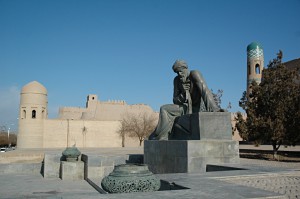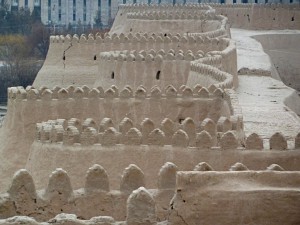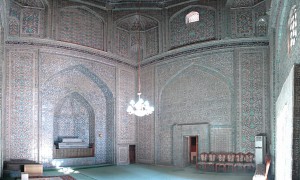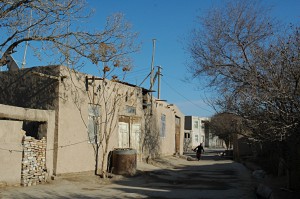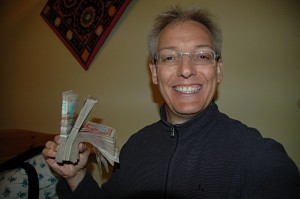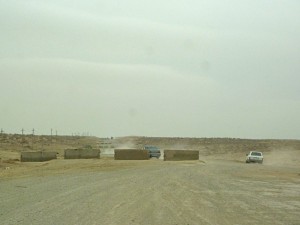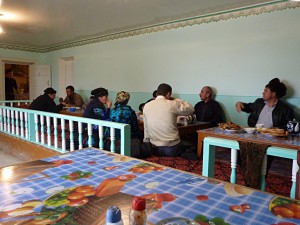I was definitely looking forward to the day when I left Turkmenistan and I could start discovering the famous ancient cities of the silk road in Uzbekistan. Also to the day when I could freely move around in a country again. But how would the border crossing work this time?
After the breakfast at the hotel Uzboy in Dashoguz the driver to the border showed up at 9 o’clock. From entering the country I knew that I had to be patient with the Turkmen officers, but that no problems were to be expected. I was more anxious about the Uzbek side of the border, since I had read a few not so happy stories.
When we finally arrived at the border after an about 20 minute ride, I was shocked. Dozens of people were standing in front of the gates and nothing seemed to move. But when the officials spotted me, they had me move to the front of the queue. Of course I had a bad feeling for all the people in the queue, especially since many of the people looked like they had been waiting for quite a while. Upon leaving Turkmenistan I had to fill in a customs declaration form, which was not necessary upon entering the country. The officers were so happy to see a face other than Turkmen and Uzbeks that filling in the form was more a form of entertainment than anything else. A young officer speaking very well English approached me and when he asked for my profession drifted off into a discussion of IT and programming languages. He had worked a while in IT and thus was happy to talk to somebody he could relate to.
Once I had the Turkmen exit stamp, I could board a minivan, which drove us to the Uzbek side of the border. I immediately received the Uzbek entry stamp in my passport, but then had to fill in two copies of same customs declaration form as upon exit of Turkmenistan. Fortunately I knew from my guide book, that I had to fill in exact amounts of money, since the customs officers might check this. I did this for all the money I had on me, leaving out everything that was well hidden inside my backpack. I will just have to remember that I was not allowed to export more money from Uzbekistan, than I had brought. The first customs officer was happy about the papers, worked through them and told me to proceed, but the second one spotted a mistake in my declaration. I had written that my country of destination was Kyrgyzstan, but it was supposed to be Uzbekistan. Thus I was sent back to fill in two new copies of the form. When coming back with the newly filled in forms, I was worried that this procedure might repeat a few times. But my worries were unfounded and the second time I could get through customs with no problems. The officer even managed a smile. Crossing the border thus had taken about one hour in total.
Now it was time to get used to Uzbek shared taxis. To help with negotiation, the man sorting out passengers and cars called an English speaking friend. This friend then asked, what I would be ready to pay for the ride. Unfortunately I had no idea about realistic pricing and my price lay four times below what they asked. Finally we agreed and I sat there waiting for other passengers in a smallish Daewoo Tico. A few minutes later we had a second passenger which apparently was enough for the driver to leave. In Khiva he asked for 2000 Som extra payment, which he did not get.
Since around this time of the year not all accommodation options are available, I went straight to the tourist information center and asked for a cheap place to stay. The sent me to the Mirzoboshi B&B, according to the owner one of the few which had electricity, heating and hot water. I then experienced that the term heating is only relative and I finally had a use for my sleeping bag.
I used the afternoon to get an impression of the old town and the bazaar adjacent to it, or whatever is left thereof, since it was recently moved some 4km from the city center. When entering the old town, one is immediately approached by someone selling an entrance ticket, which would be valid for 2 days. This ticket gives the right to take pictures in the old town and to visit almost all of the sights in town. Since I would be in town for the afternoon and the following day, I decided to leave the museums out on the first afternoon.
Unfortunately, the Turkmen food left a souvenir in my digestion system, such that I decided to cut Tuesday short and make an easy day on Wednesday. On Wednesday my first goal was to find Internet access, which took quite some time. I finally found a hotel which theoretically had Wi-Fi access, but I was unable to make it work with my netbook. I thus used one of the PCs at the reception of the hotel and after changing PCs finally was able to read and write a few e-mails and update my blog. I was happy to finally get a message from the Dag family in Van that they were OK even after the second earthquake had hit the city. Also it was good to see, that there are no restrictions in accessing website as far as I am converned in Uzbekistan.
After lunch I started visiting the insides of the numerous attrations in Khiva. Almost every building in the old town is a museum or otherwise accessible. I didn’t enjoy the simple museums too much, but the courtyards were a positive surprise. There is simply no courtyard which is nicely decorated with colorful tiles. Even though Khiva is a very old city, most buildings date back to the 18th and 19th century. One of the most memorable visits was the Kuhna Ark, the palace of the local Khans, and its watchtower. From the watchtower there is a splendid view of the old town and the city walls of Khiva.
For dinner I bought a loaf of bread on the market and later went to the main building of the Mirzoboshi B&B to make deal with a friend of the owner about the ride from Khiva to Bukhara. Fortunately I had realized earlier, that the owner of the B&B tended to exagerate heavily as far as prices were concerned. We thus had a length discussion and finally agreed on a pricing pattern which included a price of we picked up additional passengers and what I had to pay if we didn’t. My feeling told me, that we would not pick up any additional passengers.
We decided to meet at 8:30am for breakfast to leave the place at 9am. At least that was the plan. Around 9 o’clock, we managed to leave the building and walked the few hundrer meters to the main building. To defrost his car, my driver simply turned on the engine and let the heating do the magic. The simple trick of ice scraping has not yet arrived in Bukhara or Khiva. In the meantime I paid my bill at the B&B and went one last time to the bathroom before going on an 8 hour drive. Finally the car was ice-free and we left Khiva around 9:45am.
We had agreed to look for passengers in the first major town on the road. The drive to Hazorasp led through intensively used agricultural land. After about an hour we arrived at the city, but our delays were large enough to be later than all the buses which were going through town. Thus there was nobody left whom we could take along. I hate it when feelings like that come true.
Immediately after leaving Hazorasp, there were two major changes: on the one hand side the fields used for agriculture disappeared suddenly and made room for the desert and on the other hand side, the road quality deteriorated rapidly. I started realizing why the men had complaind that much about road quality the night before. But there is hope: there are almost 300km of construction site alongside the current road, which are there to build a quite impressive freeway across the desert. It is just frustrating to see, that at some points, the new road is almost finished, but the lanes are still closed. One thus has to drive on a road which more resembles a miniature edition of the waves of an ocean. Whenever there is a possibility to change to the new lanes, a few daring drivers do so. The majority however stays on the old lanes, afraid of being caught by the police. One exception is a new part of the road, where changing lanes is possible along an extended stretch. They tried to keep people from using the new streetbed by road blocks about every 100 meters. People just drive around those road blocks to use the new streetbed anyhow.
We stopped hald an hour for lunch at a small restaurant, where fish shashlik was served. A little later a second stop at the driver’s cousin’s restaurant followed. The cousin handed the driver a pile of money which the driver delivered to other relatives just before Bukhara. I had also opened my hands hoping to be given some money, but I was not lucky. But I was happy to receive a happy smile.
At dusk we arrived at the city of Bukhara, where I was brought to the Nodirbeg Hotel. The receptionist spoke fluently French, such that we could clarify the most important things immediately. He shocked me with the price, asking for 25US$ per night per person in a single room. All the guest houses were supposed to charge 10 US$. Follwing my shocked reaction, he asked me what I was ready to pay, and I told him he would get the 10 US$. He then offered 12US$ including breakfast and after shaking my head again, we settled on 10US$. This seems to be a common scheme. The initially offered price is about a factor of 2-3 times too high, but you counter offer has to be on the spot to make the deal work. I wonder whether this rule really works in more circumstances.
For dinner that receptions brought me to one of the few open restaurants in the old city center, where I immediately spot two tourists at a table. I asked to the whether I could sit at their table and we start figuring out which language to speak. We finally settle on Swiss German, since that is the easiest for all of us. Marysa and Stefan are on a trip around the world by Land Rover for an intended duration of 3 years. Their common journey started one and four months ago respectively. Stefan and his uncle left Switzerland by Land Rover and Marysa and Stefan are now headed for Northern Turkmenistan before crossing into Iran to eventually end up in Dubai, where they plan to ship their car to Mumbai in India to continue their trip there. According to their stories such a travel in ones own car also brings forth quite a few adventures, especially at the borders.
We separated again after dinner, the two left for Khiva, while I had two days to discover the ancient sights of Bukhara.

